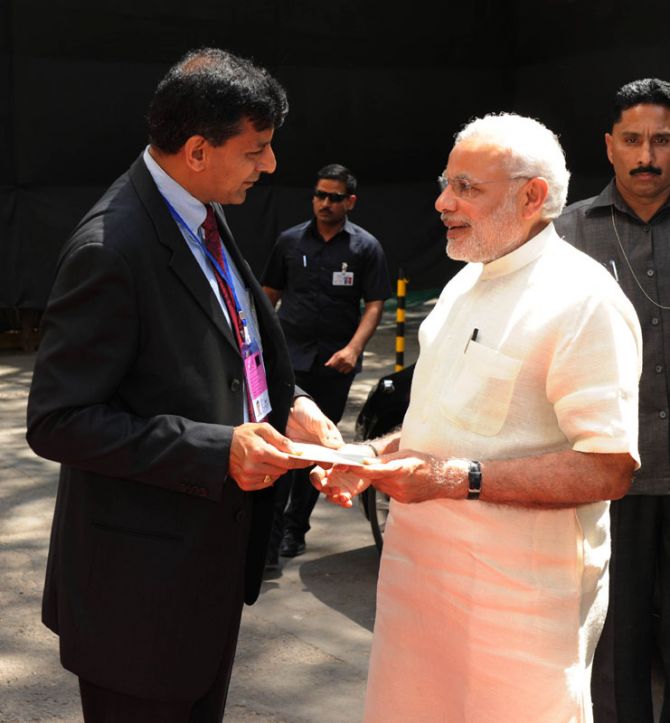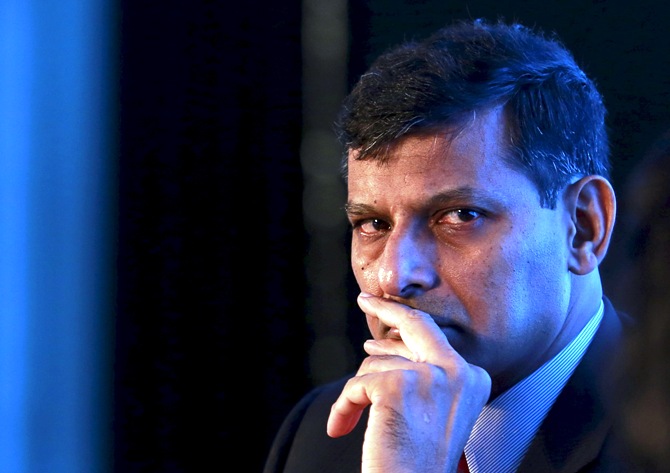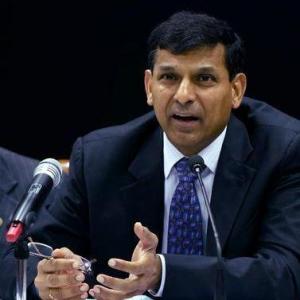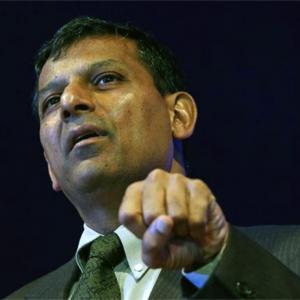On India achieving higher growth, Rajan said 9 per cent, which is the widely believed potential growth rate of the economy, is still some time away.
 Reserve Bank Governor Raghuram Rajan on Monday underlined the need to make taxation more transparent so that the Indian economy is able to attract stable inflow of foreign capital for strong growth.
Reserve Bank Governor Raghuram Rajan on Monday underlined the need to make taxation more transparent so that the Indian economy is able to attract stable inflow of foreign capital for strong growth.
He also called for more coordination between leading central banks, saying there is a need for more optimal use of the monetary policy tools globally as the world is increasingly staring at deflation.
"We need to make our tax regime more investor friendly. Let's make taxation more transparent, more predictable. Let's do all the things necessary to allow our businesses to create what is needed," he said at a seminar organised in Mumbai by 'Gateway House', a private think-tank on foreign policy.
Over the weekend, Finance Minister Arun Jaitley had also stressed on the need for friendly tax regime and promised to bring down corporate tax rate to 25 per cent over the next four years, beginning next fiscal, in a gradual manner from 34 per cent at present.
Rajan linked the easy and predictable taxation to achieving the goal of 'Make in India' plan of the government saying, "Let's make in India, but for that we need to create the framework, let's make the business easier."
He mentioned that the government is "fighting multiple cases in various higher courts and at international arbitration fora filed by a clutch of global corporations like Vodafone against its retro tax laws".
Rajan's comments, including those on need for greater coordination by central banks, come amid fears of hard-landing of the Chinese economy, the fastest growing until recently.
Besides, the euro-zone is yet to come out of the slump that began in 2008 and after a few years of revival the US economy starting again slowing in recent quarters.
China on reported slowest growth since 2008 with a GDP of 6.9 per cent for the July-September quarter.
Domestically, as prices of certain food items are on fire which led to spike in September's Consumer Price Index based inflation, Rajan called for more supply side measures to temper demand and prices. Inflation based on Wholesale Price Index has been in the negative zone for 11 months in a row, although items like pulses and onion continued to sting.
"There is a need to ensure that more underlying supply side issues are resolved so that demand side is taken care of and prices are under manageable levels," he said.
Rajan's worries on inflation stem from having cut the policy rate by an unexpected 50 bps on the September 29 policy, cumulatively bringing down the RBI policy rate by 125 basis points since the beginning of the year to 6.75 per cent.
He also has a mandate to tie consumer prices at or below 6 per cent by January next. The economy slipped to 7 per cent growth in the first quarter of the current fiscal, down 50 bps from the previous quarter.
RBI has set a 7.6 per cent GDP target this fiscal while the government is eyeing over 8 per cent.
On India achieving higher growth, Rajan said 9 per cent, which is the widely believed potential growth rate of the economy, is still some time away.
To a question on whether the country can attain much higher levels of growth without inflation, he said: "The answer is no. We have to create underlying supply conditions that would allow us to sort of have much higher demand. In some sense I see 9 per cent growth as a situation where we are investing tremendous amount and thus creating the supply which will then help the demand. So what we need to do is not just boost demand, but we need to boost supply also, which means lot of work on a number of fronts which the government is currently engaged".
He added: "It is a steady process rather than an overnight process. It will take some time. I don't think that we will go
overnight. That (the 9 per cent) is certainly an aspiration we should have, but we need to eliminate the supply constraints, including our human capital."
Rajan also emphasised upon the need to create jobs, saying that "if we look around in the country, one of the biggest sources of worry that business people have is they don't find the people for the kind of jobs that they have. We need to improve the quality of our human capital".
He added that India is a very open economy, very dependent on international markets being open. "We buy lot of energy, lot of commodities. So we need international market to be very open and very competitive."









